|
|
|
Sort Order |
|
|
|
Items / Page
|
|
|
|
|
|
|
| Srl | Item |
| 1 |
ID:
173175
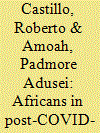

|
|
|
|
|
| Summary/Abstract |
In this article, we reflect on critical questions relating to the future of African migration to China in the post-COVID-19 world at the backdrop of the mistreatment many Africans received as part of the pandemic control in China. These questions include: Is this the end of African migration to China as we know it? Will COVID-19 fundamentally change how we think about migration, mobility and wellbeing in the People’s Republic of China (PRC)? What will be the effect of the post-COVID-19 regime on the social identity and wellbeing of the African diaspora in Guangzhou and other Chinese cities?
|
|
|
|
|
|
|
|
|
|
|
|
|
|
|
|
| 2 |
ID:
120749
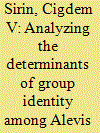

|
|
|
|
|
| Publication |
2013.
|
| Summary/Abstract |
This study systematically explores the factors that affect collective identity associations within the Alevi community in Turkey by employing the social identity approach and examining survey data collected through fieldwork. The results show that Kurdish Alevis express lower levels of attachment to their religious identity as compared to Turkish Alevis. The results also indicate that personal experiences of discrimination tend to increase one's prioritization of Alevi identity. Last, no significant differences are observed regarding group identity between Alevis who reside in urban areas and those who live in rural areas.
|
|
|
|
|
|
|
|
|
|
|
|
|
|
|
|
| 3 |
ID:
091691
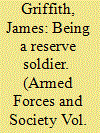

|
|
|
| 4 |
ID:
171680
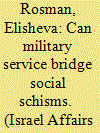

|
|
|
|
|
| Summary/Abstract |
Can the military bridge social schisms? Conventional wisdom supports this assumption. However, it seems that, at best, the effect of military service on bridging social schisms and promoting social cohesion is limited. This article examines the extended effect of contact hypothesis in the military, both in practice and as an element capable of bringing about a change in veterans’ thinking. It asks: are veterans who had diverse friendships during their service more likely to have diverse friendships in the future? If so, do they attribute their ability and willingness to include others within their ingroup to their military service? Based on findings from a study of Israeli college and university students, the article demonstrates that while indeed service friendships may be short lived, service alongside members of outgroups has certain longer-term effects and influences the social perception of veterans. Social messages can be both positive and negative and teach veterans the limits of redrawing social boundaries.
|
|
|
|
|
|
|
|
|
|
|
|
|
|
|
|
| 5 |
ID:
116191


|
|
|
|
|
| Publication |
2012.
|
| Summary/Abstract |
This article is based on a series of interviews with 73 individuals who participated in the 1948 war. Though the war had many physical as well as emotional casualties, surprisingly a relatively small portion of individuals were willing to admit the occurrence of combat stress reactions. This finding is quite puzzling in the face of the drastic course of the war. Hence, it is speculated that denial and suppressive processes underlie the interviewees' declarations. Moreover, it is assumed that this denial process is part of the construction of a monolithic social identity. The origins of this process and its implications for Israeli social identity are discussed.
|
|
|
|
|
|
|
|
|
|
|
|
|
|
|
|
| 6 |
ID:
069083
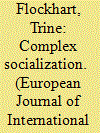

|
|
|
| 7 |
ID:
104080
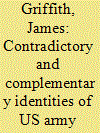

|
|
|
|
|
| Publication |
2011.
|
| Summary/Abstract |
Over the past three decades, evolving threats to U.S. national security have necessitated changes in the missions, structure, and organization of reserve forces. These changes, while intended to redefine the purposes and functions of the U.S. reserve force, at times had unanticipated effects on the individual reservist's experience of and identity with reserve military service. Emergent identities include the obliged-conscripted citizen soldier, weekend warrior, instrumental volunteer, identity seeker, soldier warrior, and conservative ideologue. The author elaborates on these identities and their association with geopolitical events and corresponding responses in the U.S. national defense strategy and concludes by discussing the implications of more recent identities for adequately staffing and readying the U.S. reserve force.
|
|
|
|
|
|
|
|
|
|
|
|
|
|
|
|
| 8 |
ID:
190897
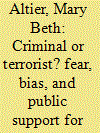

|
|
|
|
|
| Summary/Abstract |
The potential threat posed by returning and repatriated foreign fighters and the upcoming release of homegrown violent extremists from prisons in developed democracies has raised interest in terrorist rehabilitation programs. Few studies, however, systematically examine how the public views such programs. Drawing on research on public attitudes toward prisoner reentry in criminology and social psychological theory, this study offers a series of hypotheses about support for rehabilitation programming for terrorist offenders. These hypotheses are then tested through a survey experiment on a nationally representative sample of 1,021 adult citizens in the United States. The results show that the public is less supportive of postrelease rehabilitation programming for terrorists than other criminal offenders. Support is also lower when an Islamist, rather than a white nationalist, offender is referenced. Support increases when a referenced Islamist is described as a juvenile convicted of a less serious offense. Men, younger individuals, those with some college education, and self-identified liberals are more likely to support terrorist rehabilitation programming. Finally, irrespective of treatment, respondents are most likely to cite evidence of effectiveness as the factor that would increase their support for rehabilitation programming.
|
|
|
|
|
|
|
|
|
|
|
|
|
|
|
|
| 9 |
ID:
083727
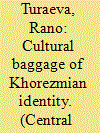

|
|
|
|
|
| Publication |
2008.
|
| Summary/Abstract |
After Uzbekistan gained its independence from Soviet rule, important political and economic changes took place. The mobility of the population has since then increased drastically and created new spaces for the negotiation of social identities as well as new strategies for identity politics among the culturally and regionally diverse population of Uzbekistan. This article aims to contribute to the discussions on social identity and its 'contents' in the light of migration processes. The main argument centres on the importance of what Barth called the 'cultural stuff' of social identities when maintaining boundaries during identification processes. The analysis focuses specifically on certain singing and dancing practices of Khorezmians. It shows how these practices survive, but are also transformed in the context of Tashkent, the capital city of Uzbekistan, where people from different regions reside together and are engaged in performing and presenting their own group identity in reference to 'others'
|
|
|
|
|
|
|
|
|
|
|
|
|
|
|
|
| 10 |
ID:
159814
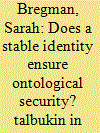

|
|
|
| 11 |
ID:
153565
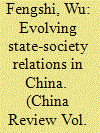

|
|
|
|
|
| Summary/Abstract |
This special volume attempts to enhance the understanding of a seemingly
paradoxical pair of patterns in contemporary Chinese politics,
namely, the resilience of the Communist regime and the robustness of
social autonomy. Th e papers, while contributing to the central theme
from different sectors/subfields, converge on the aspect where the
agencies of the Chinese state and the society interact and exert infl uence
on each other. Instead of simply giving away summaries and revealing
intricate findings, this introduction focuses on the overall scope and
shared analytical perspective of all the papers included, and the interlinkages
across them in order to facilitate the reading of the whole volume.
|
|
|
|
|
|
|
|
|
|
|
|
|
|
|
|
| 12 |
ID:
165781
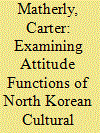

|
|
|
|
|
| Summary/Abstract |
Article Type: Research Paper Purpose—Functions of attitudes serve a critical role in the development of individual motivation and behavior. Attitudinal preferences can be manipulated through an idealized representation, such as a poster. The purpose of this research is to examine an example of North Korean cultural propaganda for symbolism intended to influence an observer's attitudes. Design, Methodology—A single poster with a plethora of symbolic representation was qualitatively examined through a psychological lens of attitude functions. Findings—The examination showed stark images and symbolism paint a compelling picture full of value-driven and defining notions in which each act to inform the observer's perceptions of their own selves. Attributes of the social identity of an ideal citizen through multiple life stages was derived. Practical Implications—Useful for policymakers and academics by offering insight into the social structure and symbolic importance that underpins North Korea. It also informs scholars on applied methods used by a government to shape a nation's cultural identity. Originality, Value—This is one of few articles to further propaganda research of North Korea. It may be the only article to apply a psychological lens of attitude functions to examine the said propaganda.
|
|
|
|
|
|
|
|
|
|
|
|
|
|
|
|
| 13 |
ID:
149879
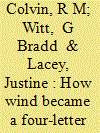

|
|
|
|
|
| Summary/Abstract |
Wind is recognised as a key source of renewable energy. Despite broad public support for the sector, wind energy proposals have routinely triggered social conflict and localised opposition. To promote social acceptance and avoid conflict, the wind energy sector undertakes community engagement. This paper interrogates the community engagement undertaken in King Island (Tasmania, Australia) for a large scale wind energy development proposal which did not proceed to implementation due to external economic factors. Despite the proponent's adoption of what was described as a ‘best practice’ community engagement strategy, the proposal caused significant social conflict for the community. In-depth interviews (n=30) were conducted with members of the King Island community and were qualitatively analysed through the social identity lens. Five key drivers of the local conflict were identified: problematic pre-feasibility engagement; the lack of a third-party facilitator of the community consultative committee; holding a vote which polarised the community; the lack of a clear place in the engagement process for local opposition, and; the significance of local context. These findings are instructive for improving community engagement practice for wind energy and other energy generation and land use change sectors.
|
|
|
|
|
|
|
|
|
|
|
|
|
|
|
|
| 14 |
ID:
106275
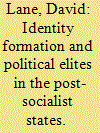

|
|
|
| 15 |
ID:
186821


|
|
|
|
|
| Summary/Abstract |
This article explores the lived experiences of some Indian migrant workers (MW) during the first COVID-19 pandemic nationwide lockdown, investigating their plights from a social identity perspective. It analyses crises associated with the COVID-19 pandemic, and with hunger and starvation. Drawing on a qualitative study conducted with twelve participants in the city of Pune in the Western Indian state of Maharashtra, the findings suggest that the participants’ plights have been exacerbated by the COVID-19 pandemic. The findings indicate the need for policy responses to focus on addressing conditions of work, terms of employment and access to necessities for Indian MW, including ensuring conditions for a prompt job-ready recovery and mental health care after the COVID-19 pandemic.
|
|
|
|
|
|
|
|
|
|
|
|
|
|
|
|
| 16 |
ID:
062534
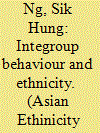

|
|
|
| 17 |
ID:
128956
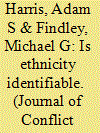

|
|
|
|
|
| Publication |
2014.
|
| Summary/Abstract |
Ethnicity is frequently posited as an important factor in civil violence and other political contexts. Despite the attention that ethnicity receives, its effects depend on an important, but mostly ignored, assumption that ethnicity is identifiable within and across groups. There is likely considerable variation in peoples' abilities to identify each other. Certain individuals within groups might be better at identifying others' ethnicities; further, different types of information might aid identification better. We contend that the strength of an individual's ethnic identity influences her ability to identify others correctly. We test this argument using an experiment in the Eastern Cape of South Africa in which individuals attempted to identify members of the major black ethnic groups. We find that the average individual struggles to identify ethnicity correctly in many conditions. Individuals with a stronger identity, however, are often better at correctly identifying the ethnicity of others relative to the average individual. When receiving contradictory information, individuals with stronger identities were sometimes deceived more easily than others. These results have implications for a diverse set of studies relying on the identifiability assumption.
|
|
|
|
|
|
|
|
|
|
|
|
|
|
|
|
| 18 |
ID:
174602
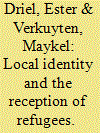

|
|
|
|
|
| Summary/Abstract |
A strong local community identity often goes together with the rejection of refugees and other migrants. However, there is also the possibility that such a local identity actually stimulates the reception of refugees. Based on the social identity perspective and our ethnographic fieldwork we examine this possibility in the context of the small town of Riace in Southern Italy. The analysis demonstrates that there is a local identity of hospitality that is construed as a continuation of the town’s past. This identity of local hospitality is enacted and maintained in various ways in the life of the town in which the mayor as an entrepreneur of the local identity plays a critical role. However, there are also some challenges to the future of the local identity of hospitality that relates to available financial resources and competition over local opportunities.
|
|
|
|
|
|
|
|
|
|
|
|
|
|
|
|
| 19 |
ID:
131105
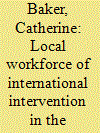

|
|
|
|
|
| Publication |
2014.
|
| Summary/Abstract |
The international organizations involved in peacebuilding, democratization and peacekeeping in the Yugoslav successor states have employed thousands of locally recruited workers as project officers, language intermediaries and support staff. This makes them a distinct employment sector within these post-socialist and in several cases post-conflict economies, most significantly in Bosnia-Herzegovina and Kosovo. This paper evaluates arguments in favour of regarding this workforce firstly as a group of workers suffering precarity and secondly as a privileged social elite. While there are good grounds for recognizing them as a distinctive social group, this distinctiveness has not led to a widely expressed social identity based on the commonalities of their employment.
|
|
|
|
|
|
|
|
|
|
|
|
|
|
|
|
| 20 |
ID:
090795
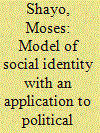

|
|
|
|
|
| Publication |
2009.
|
| Summary/Abstract |
This article develops a model for analyzing social identity and applies it to the political economy of income redistribution, focusing on class and national identities. The model attempts to distill major findings in social psychology into a parsimonious statement of what it means to identify with a group and what factors determine the groups with whom people identify. It then proposes an equilibrium concept where both identities and behavior are endogenously determined. Applying this model to redistribution helps explain three empirical patterns in modern democracies. First, national identification is more common among the poor than among the rich. Second, national identification tends to reduce support for redistribution. Third, across democracies there is a strong negative relationship between the prevalence of national identification and the level of redistribution. The model further points to national eminence, national threats, and diversity within the lower class as factors that can reduce redistribution.
|
|
|
|
|
|
|
|
|
|
|
|
|
|
|
|
|
|
|
|
|